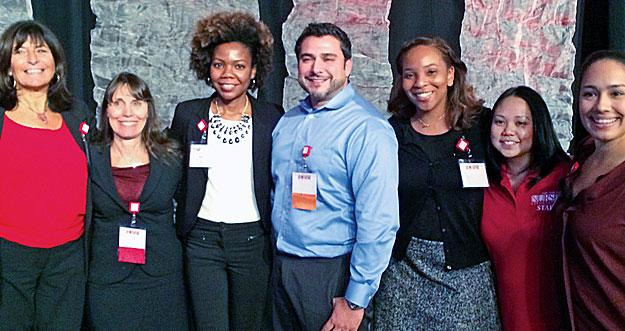Young nurses take the lead

The generation of nurses that is on the cusp of retirement has seen radical changes in healthcare. When they started, there were no electronic medical records or lifting devices, few safety protections, and low wages. This generation won better wages and working conditions and more respect for the profession. More recently, they have experienced hospital closures, privatization and the corporatization of healthcare. How will the younger generation step up to these new challenges? That was the major theme of the Young Nurse Leaders Plenary at Convention this year.
If there was any question that young nurses would not rise to these new challenges, it was quickly answered by the three young nurse leaders who took the stage at Convention: Jalisa Saud, Michelle Rodriguez and Dawn Minerve. These young RN leaders spoke passionately about winning respect, greater decision-making power in their facilities, and safe staffing for all nurses.
Each young leader spoke from the heart about their particular path to becoming a leader, leaving older and younger nurses in the audience with a lot to think about.
Being active
Jalisa Saud, RN, spoke about the importance of getting educated both in nursing and in the union, through steward training and other opportunities to get active, because as she put it, “Knowledge is power.”
“Education really begins on your unit — with your team,” said Jalisa. “To build your army, you need to show young people leadership. You need to show younger people who may not be active in the union what they can do. We’ve all heard that nurses eat their young, but that’s changing. Nurses of all ages are learning to become better leaders and mentors.”
Michelle Gonzalez spoke about what led her to become a nurse. Growing up in the Bronx, she saw first hand how her uncle experienced shortcomings in the healthcare environment, and she was dedicated to changing that.
She said, “I always think of the quote from Ghandi, ‘Be the change that you wish to see in the world.’ I felt that if I became a nurse, I could be that change.”
Young nurse motivations
Michelle pointed to all the leaders and mentors at her hospital who helped put her on the path to leadership, always asking her to get involved and pushing her to be her best.
Dawn Minerve spoke eloquently about her struggle to find her voice and her power as a young nurse. And she shared her sense of being isolated at work, like “a toddler dropped into the deep end and told to swim.”
“At first, I would pray every morning that nothing terrible happens today, and then get home at night and worry that I missed something because we were so understaffed,” explained Dawn. “My leadership developed organically from a place of frustration. NYSNA helped give me my voice and the power to change what I saw was wrong in my hospital.”
NYSNA’s young leaders are inspiring and an essential part of our growing strength. They are among a new generation of leaders coming up in NYSNA, who have picked up the stethoscopes and POAs as the older generation retires. And they are already showing they are more than ready to tell hospital executives: we say “no” to profits over patients.